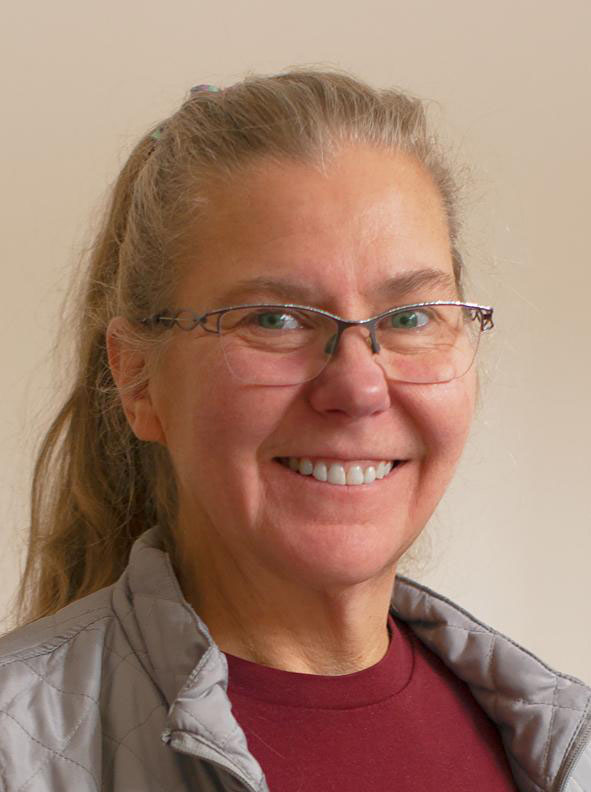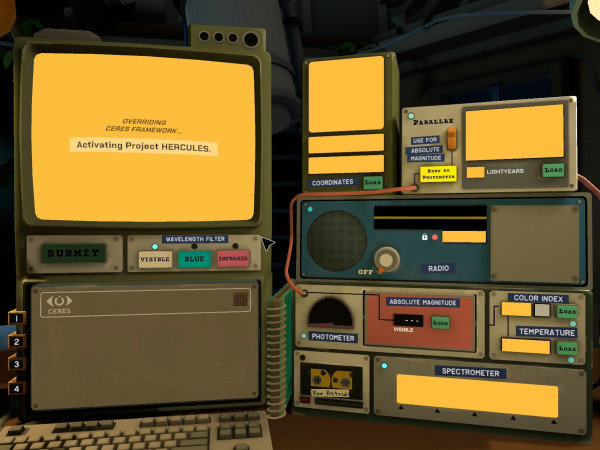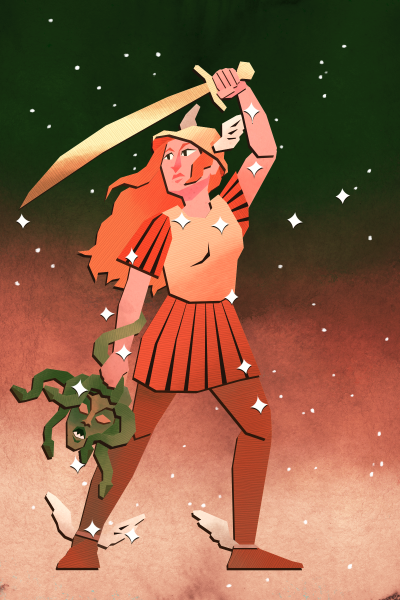Field Day Blends Art and Science for Video Games That Teach, Engage
UW–Madison Research Lab+Game Studio Launches Game, Selects Concept for Another
November 11, 2025 | By Karen Rivedal, Office of Research & Scholarship

Project Hercules, Field Day's newest game, invites players to step into the shoes of Astrid, an astronomer in the year 2098.
Ann Marsh has heard the question before.
The UW–Madison teaching assistant and PhD candidate in entomology said people ask her “all the time” why, out of all the living things on Earth, she chose to study insects.
“And I always tell everybody, ‘If you could see what I see through the microscope, you would know why,’” she said. “This whole world of small insects that are out there, small organisms that are so beautiful and complex and specialized—they're just so wonderful.”
This blend of beauty and utility also drives UW–Madison’s Field Day, a research lab and game design studio based in the School of Education’s Wisconsin Center for Education Research (WCER), where Marsh recently helped develop the concept for Field Day’s next planned game: an exercise in agricultural entomology in which players will help farmers protect their crops by managing a lively cast of “good bugs” and “bad bugs.”

Field Day Studio Director Sarah Gagnon
“There is this unique interrelationship between art and science that we see in so many ways, and I’m so grateful for it,” said Sarah Gagnon, an artist and director of Field Day’s game studio. “It's like a dream that we get to work on this together.”
At a recent event, Field Day announced the concept for the coming game, to be made with a $250,000 grant, and launched its latest finished game — an astrophysics primer known as Project Hercules. Both games are products of the Wisconsin GameWorks Incubator, a new game-creation initiative that partners with the Wisconsin Department of Public Instruction. This work prioritizes UW–Madison research around an annual theme and gives Wisconsin K–12 educators a central role in developing ideas for new games.

Field Day Director David Gagnon
Project Hercules incorporates research findings from the Wisconsin IceCube Particle Astrophysics Center (WIPAC), an internationally groundbreaking, collaborative space-science research operation at the South Pole led by UW–Madison. Watch the trailer for Project Hercules online, and play the game online.
“Project Hercules has been a collaborative project with IceCube — one of the most prestigious research projects in the world,” said David Gagnon, Field Day’s founder and director. “It is an excellent example of how art, storytelling and interactive media can make complex ideas and the scientific pursuit of astrophysics accessible and interesting to the next generation of students.”
GameWorks Incubator Furthers Wisconsin Idea
The incubator program turns cutting-edge research and educator expertise into free, classroom-ready learning games for broad public engagement.
“What I love is how this work has been built with the teachers and librarians right at the table, working together to co-create these games,” said School of Education Dean Marcelle Haddix, a guest at the event. “That collaboration makes the work stronger, more relevant, and truly reflective of what classrooms and communities need today.”
Wisconsin teachers have always been part of Field Day games, providing expertise on academic standards and testing game prototypes in their classrooms. The GameWorks Incubator program deepens their participation by also including them in brainstorming days held with researchers and Field Day design staff to tease out ideas for new games.

Entomology PhD student Ann Marsh
Marsh attended an incubator day in March, when the invited participants formed four teams, each boasting a mix of K–12 teachers or librarians, university researchers, and Field Day design staff. The teams learned about design concepts and brainstormed ideas for new games around a life-sciences theme, with concept pitches from each team at day’s end and a promise from Field Day to pick at least one of them to make in a few months.
“It was really inspiring to bring all these ideas together and the energy in the room was just incredible,” said Marsh, whose team members included lead researcher Claudio Gratton, who is a professor of entomology, associate scientist Eric Booth, and librarian Chris Baker.
In addition to the agricultural entomology game pitched by Marsh’s team and selected for immediate development, the three other teams came up with ideas for games involving genetics, plastics in the waterways, and fungi. Sarah Gagnon said those were “excellent ideas” that could be developed into games by Field Day later if funding can be arranged.
Department of Public Instruction State Librarian Ben Miller said all GameWorks partners were “living the Wisconsin Idea,” the principle that university education and research should improve people's lives beyond the boundaries of the classroom.

Project Hercules game screen
“We’re not just talking about the idea,” said Miller. “We have tangible things coming out of it. Having these conversations and pulling this stuff out of the ether and turning it into things that kids can engage with and learn with, that's so critically important.”
As digital products, all Field Day games can be accessed in school classrooms, libraries, or virtually any place with an internet connection.
“We’ve created this mechanism for pretty incredible reach and scale,” said David Gagnon, who also mines video game data for academic insights into how people learn. “We’ve come up with a novel — but tested, and basically infinitely scalable — mechanism for disseminating university research to the public.”
Field Day games are played by hundreds of thousands of students across the country every month — totaling more than 1.5 million game plays per year. The games are free to teachers, students, and the public from Field Day’s website and Vault Learning Games. Developed by UW–Madison and the Wisconsin Department of Public Instruction, Vault is described as the largest library of free learning games online. Classroom-ready for grades 3–12, the games are curated by educators, researchers, and designers from dozens of studios.
Motivating Power of Engaging Games
At Field Day, celebrating its 10th anniversary this year, a game-loving team of artists, engineers, designers, storytellers and researchers works to perfect the tricky balance of producing educational games that children will want to play. To do it, they blend contemporary research from experts on and off campus with engaging visuals, music, and gameplay, all while incorporating academic standards used in Wisconsin public schools and beyond.
“Part of what these games can give kids is access to incredible knowledge that ignites their imaginations,” said WCER Director Courtney Bell.

WIPAC Director Dan Hooper
WIPAC Director Dan Hooper can vouch for the life-altering potential of computer games. At the Field Day event, he described not being the strongest student in his youth. He was bored by school — and especially by history class, with its many places, names and dates.
But one day, Hooper discovered the wildly popular computer game “Oregon Trail.” The strategy-based game was developed by a Minnesota consortium in the early 1970s to teach eighth graders about the realities of pioneer life in the mid-1800s on the historic Oregon Trail, a difficult and dangerous journey of more than 2,000 miles from Missouri to Oregon.
Hooper was hooked.
“I stayed after school and I played it and loved it,” he said, crediting the game for sparking in him a lifelong fascination with history.
Might Project Hercules wield the same magic? Hooper, a professor of physics, believes it will.
“They’re out there right now — countless kids who think school is boring and astronomy is boring, and Project Hercules is going to convince some of them that it’s not,” he said.
Teaching Players About Space in Project Hercules
Project Hercules invites players to engage by taking on the role of Astrid, an astronomer working in the year 2098 to identify objects in the night sky and uncover the mystery of an impending celestial event. It uses research from WIPAC’s IceCube Neutrino Observatory.
Built in 2011, the observatory consists of more than 5,000 sensors buried deep within the Antarctic ice to capture streams of subatomic particles born from black holes and exploding stars and other not-fully-understood phenomena. The tiny neutrinos carry messages from deep space that researchers believe could answer big questions in physics, such as the nature of dark matter, and help understand our universe’s most extreme and volatile environments.

Project Hercules game art
WIPAC researchers are also studying cosmic rays and “ripples in the fabric of spacetime” called gravitational waves, said Hooper, promising additional discoveries ahead that could inform the game. “We can learn fundamentally new and exciting information with this technology, things that we couldn't do until right now.”
Targeted to students in grades 8–12, Project Hercules is designed to spark excitement and curiosity about astronomy by communicating the professional practices of observational astronomers, including the use of instruments such as visible telescopes, photometers, and spectrograms, as well as participation in a community of scientists.
“Project Hercules puts key scientific practices into the hands of students through an engaging storyline and challenging logic puzzles,” said Ellen Bechtol, outreach program manager for WIPAC. “This gives us a new way to share our science in classrooms and beyond. Working with the creative team at Field Day was a highlight through production.”
The game meets Wisconsin academic standards by helping students understand basic astronomy terms and phenomena while learning to gather and interpret astronomical data. Students also learn to solve logic puzzles, compare and contrast different celestial objects, and classify stars by their measured properties.
The game is meant to inspire a bit of awe, too, encouraging students to think more deeply.
“Project Hercules brings together myth and meaning-making with scientific inquiry, showing how humans have always looked to the stars both to understand our universe and to tell stories about our place within it,” Sarah Gagnon said.
***********************
About Field Day
Field Day, a project based at the Wisconsin Center for Education Research in UW–Madison’s School of Education, is a research lab and game design studio that brings contemporary research to the public, using game data to understand how people learn. Publicly funded through grants, the team at Field Day Lab is committed to providing games to educators for free. Using an ethos that games turn complicated topics into fun, hands-on experiences that reach people, the lab aims to better understand how people learn with games, building out theory and designing effective interventions.
Among Field Day’s popular and award-winning games are “Headlines and High Waters,” designed to help students build media literacy, and “Legend of the Lost Emerald,” an immersive, boldly illustrated adventure game about shipwrecks inspired by actual Great Lakes history that lets students step into the shoes of a maritime archaeologist.
About the Wisconsin Center for Education Research
The Wisconsin Center for Education Research at UW–Madison’s No. 1-ranked School of Education is one of the first and most productive education research centers in the world. It has assisted scholars and practitioners in developing, submitting, conducting and sharing grant-funded education research for over 60 years.
WCER’s mission is to improve educational outcomes for diverse student populations, positively impact education practice and foster collaboration among academic disciplines and practitioners. Learn more at wcer.wisc.edu.


